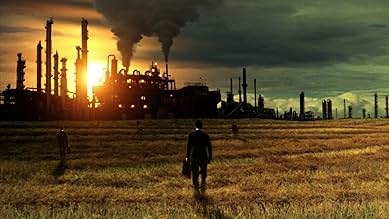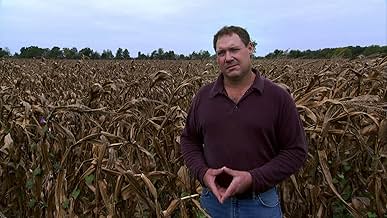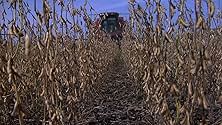ÉVALUATION IMDb
7,8/10
53 k
MA NOTE
Ajouter une intrigue dans votre langueAn unflattering look inside America's corporate controlled food industry.An unflattering look inside America's corporate controlled food industry.An unflattering look inside America's corporate controlled food industry.
- Nommé pour 1 oscar
- 7 victoires et 20 nominations au total
Histoire
Le saviez-vous
- AnecdotesOn the Region 1 DVD packaging, the UPC bar-code on the cow is different from the one shown on the theatrical poster. The bar-code on the poster is 4-73762-52481-6-(18). The bar-code on the Region 1 DVD packaging is 8-76964-00216-5 : the same bar-code that appears on the back cover of the DVD. As of 2022, the bar-code used on the poster is not an active code.
- Citations
Michael Pollan: There are no seasons in the American supermarket. Now there are tomatoes all year round, grown halfway around the world, picked when it was green, and ripened with ethylene gas. Although it looks like a tomato, it's kind of a notional tomato. I mean, it's the idea of a tomato.
- ConnexionsFeatured in Durch die Nacht mit...: Tim Raue und Dave Arnold (2009)
- Bandes originalesSunny L.A.
Written by Nancy Peterson
Performed by Great American Swing Band
Commentaire en vedette
I recall a story where a teacher had tasked her students to draw a picture of a chicken for art class, and to her surprise, one of them drew a chicken fillet. I suppose the point here is that we've become so detached from the origins of our food sources, save for the form they take when already in the supermarkets, cured and prepared with ready to cook/eat processes becoming the norm of our daily lives. And with periodic cases of food scares and poisoning, this film takes a look throughout the food chain of today, and although it's rather US-centric, it still has plenty of relevance here since after all, we import almost everything.
With technological research applied to our food sources, be it the humble grain or to the meat to satisfy all us omnivores out there, the drive of course is to produce enough to feed all the mouths, although sometimes things get done out necessity, and spiral out of control when the pressure's there to produce food that can grow faster, fatter, and to shorten the time it takes to get to the dining table.
Directed by Robert Kenner, this is a documentary that followed some of the points that you would have become familiar with in films like Fast Food Nation, whose writer also provided an interview and laid the foundations of our predicament quite squarely on the MacDonald brothers, who had revolutionized the way food gets prepared, presented, and sourced. Kenner cleverly sections the film into digestible chunks, each focused on aspects of the food chain and the products themselves. The stark images and footage on how animals are treated as products in an assembly line subjected to the mass production (killing) process, will definitely shock you into thinking – that cannot be right, nor humane. Will it make you swear off meat? Probably.
In fact, the picture got painted in very bleak terms, where food conglomerates continue to grow in size and profits, resulting in the power they have over consumers, politicians and the likes, where choice and options are but a facade on shelves because the brands and products all belong to common parents. Corporations exists for profits, and are not responsible for consequences arising from their drive to make money. Everything else that resulted from that drive, whether or not a negative impact on society and human lives, can be considered collateral in their goal to feed the earth, and profit from it. Naturally, none of the conglomerate representatives wanted to be interviewed for the film, and that comes with no surprise, especially when their underhanded tactics in dealing with opposition, and corrupt practices get exposed through hidden cameras.
And in some ways, the film too makes you feel a little guilty for being part of the fuel on the demand side of things. With demand comes the opportunity to supply, and make money, and corporate social responsibility is still something relatively new as a buzzword that has plenty of room to be translated into action.
But the film is not all noise in complaining and presenting a doomsday scenario, and that's where the film earned merits in providing workable alternative solutions rather than just barking up a tree. It balanced the issues on what we could do, and engages the audience to be catalyst for change, making one realize that one has the power to skew demand to more acceptable methods of production, rather than one bred on convenience. It's not all serious nature here, as Kenner does inject enough well-placed humour into the documentary so that it doesn't come off as too heavy-handed in treatment, in pointing the loaded guns of blame onto others.
Food, Inc. is an incredible documentary about where our food comes from, and for those without an inkling of knowledge, it would be worthwhile to sit through this film and get some enlightenment. More importantly of course, is to take action to prevent our stomachs from becoming just repositories for Salt, Fat and Sugar. Highly Recommended.
With technological research applied to our food sources, be it the humble grain or to the meat to satisfy all us omnivores out there, the drive of course is to produce enough to feed all the mouths, although sometimes things get done out necessity, and spiral out of control when the pressure's there to produce food that can grow faster, fatter, and to shorten the time it takes to get to the dining table.
Directed by Robert Kenner, this is a documentary that followed some of the points that you would have become familiar with in films like Fast Food Nation, whose writer also provided an interview and laid the foundations of our predicament quite squarely on the MacDonald brothers, who had revolutionized the way food gets prepared, presented, and sourced. Kenner cleverly sections the film into digestible chunks, each focused on aspects of the food chain and the products themselves. The stark images and footage on how animals are treated as products in an assembly line subjected to the mass production (killing) process, will definitely shock you into thinking – that cannot be right, nor humane. Will it make you swear off meat? Probably.
In fact, the picture got painted in very bleak terms, where food conglomerates continue to grow in size and profits, resulting in the power they have over consumers, politicians and the likes, where choice and options are but a facade on shelves because the brands and products all belong to common parents. Corporations exists for profits, and are not responsible for consequences arising from their drive to make money. Everything else that resulted from that drive, whether or not a negative impact on society and human lives, can be considered collateral in their goal to feed the earth, and profit from it. Naturally, none of the conglomerate representatives wanted to be interviewed for the film, and that comes with no surprise, especially when their underhanded tactics in dealing with opposition, and corrupt practices get exposed through hidden cameras.
And in some ways, the film too makes you feel a little guilty for being part of the fuel on the demand side of things. With demand comes the opportunity to supply, and make money, and corporate social responsibility is still something relatively new as a buzzword that has plenty of room to be translated into action.
But the film is not all noise in complaining and presenting a doomsday scenario, and that's where the film earned merits in providing workable alternative solutions rather than just barking up a tree. It balanced the issues on what we could do, and engages the audience to be catalyst for change, making one realize that one has the power to skew demand to more acceptable methods of production, rather than one bred on convenience. It's not all serious nature here, as Kenner does inject enough well-placed humour into the documentary so that it doesn't come off as too heavy-handed in treatment, in pointing the loaded guns of blame onto others.
Food, Inc. is an incredible documentary about where our food comes from, and for those without an inkling of knowledge, it would be worthwhile to sit through this film and get some enlightenment. More importantly of course, is to take action to prevent our stomachs from becoming just repositories for Salt, Fat and Sugar. Highly Recommended.
- DICK STEEL
- 31 juill. 2009
- Lien permanent
Meilleurs choix
Connectez-vous pour évaluer et surveiller les recommandations personnalisées
- How long is Food, Inc.?Propulsé par Alexa
Détails
- Date de sortie
- Pays d’origine
- Site officiel
- Langue
- Aussi connu sous le nom de
- Food, Inc.
- Lieux de tournage
- sociétés de production
- Consultez plus de crédits d'entreprise sur IMDbPro
Box-office
- Brut – États-Unis et Canada
- 4 417 674 $ US
- Fin de semaine d'ouverture – États-Unis et Canada
- 60 513 $ US
- 14 juin 2009
- Brut – à l'échelle mondiale
- 4 606 199 $ US
- Durée1 heure 34 minutes
- Couleur
- Mixage
- Rapport de forme
- 1.78 : 1
Contribuer à cette page
Suggérer une modification ou ajouter du contenu manquant

Lacune principale
By what name was Les alimenteurs (2008) officially released in India in English?
Répondre























